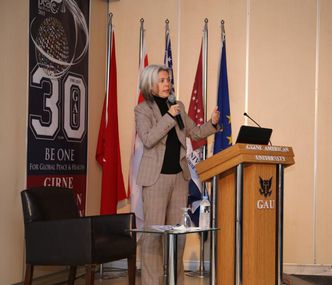
FACULTY OF COMMUNICATION
News
GAÜ'DEN

“Greek Propaganda in Postal Activities” Discussed at GAU
Girne American University held the second event of “Mediterranean Talks” that aims to resolve communication codes in generally the Mediterranean and especially Cyprus.
GAU in cooperation with GAU Cyprus Research Center (GAU-KAM) and the Faculty of Communication held the event at Cyprus Kyrenia Campus Millennium Senate Congress Center, in the second week of the commune for resolving the communication codes in generally the Mediterranean and especially Cyprus, the subject “Propaganda in the Mediterranean” was taken into account.
During the first speech at the event, GAU Associate Dean of the Faculty of Communication - Associate Prof. Dr. Elif Asude Tunca stated that with the name of Mediterranean Talks the commune will be held every Wednesday at the GAU Millennium Senate Congress Center and then discussed the propaganda subject. Tunca said in the speech;
“Propaganda is a communication process. There are three types of propaganda. Black, white and grey. The sources of all three of these are important. So, the person who sent the news, message. if the sender is open it is white propaganda and it is clear who the source is. Black is the opposite. Grey means stuck between the two; it could be known or unknown so the reality of the message is approached with suspicion. The turning point for the start of propaganda being called negative perhaps stems from the propagandist activities conducted under World War II. Nazi Germany. When we return to the exit point it’s not actually a bad meaning. In Latin spread means to expand the domain. In its history it is spreading the faith as in dissemination activities. Manipulated information has a negative impact referring to the destruction of creation” she said.
After the opening speech GAU Lecturer and Head of the GAU-KAM - Dr. Ulvi Keser, made a presentation of her collections on the subjects, named “Greek Propaganda in Postal Activities”. Keser said in the presentation;
“Published and distributed by the Greek Cypriot Administration, so many of the materials you will see are binding the government. The stamp of the government can also be considered as the seal of the state government. This collection began in 1954 and continues until this day. If I were to give examples of the stamps printed by the Greek Post Office on the subject of the merger with Cyprus, those stamps are pressed if 99% of those living on the island said “yes let’s join Greece” and said this is a Greek Island. This stamp is very interesting, in 1931 there was a rebellion on the island and it is perceived as the Greek revolt. Greeks even to this day still talk about being partners with the Turks from the Republic of Cyprus. As of today, the Postal Administration that we are a part of, while there nothing that is about us, has plenty about Makarios” she said.
GAU-KAM and GAU Faculty of Communication stated that the series of jointly organized events are open to the public and free, and announced next week’s subject “During 1955-1974 Communication in Cyprus”.

